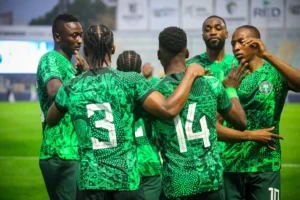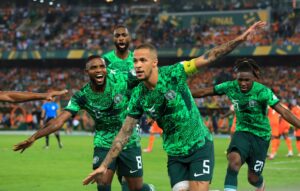Despite a roster filled with Europe’s top talent, Nigeria’s Super Eagles have failed to qualify for the last FIFA World Cup are are on route to not qualify for the 2026 tournament, On the surface, the team seems to possess a golden generation of players, MySportDab Reports
Yet, a deeper look reveals that the root causes of this decline lie not with the quality of the squad but with systemic issues that have plagued Nigerian football for years.
One of the most debated issues is the reliance on foreign-born players—those with dual nationality who were raised and developed in Europe. Critics argue that these players often view the Super Eagles as a second choice, a fallback option after they fail to make the national team of their birth country.

The argument is that this “second-choice” status translates into a lack of the passion, heart, and unwavering commitment seen in past squads. For a team that has historically relied on raw grit and patriotism, this perceived lack of motivation is a serious problem.
However, this narrative, while popular, doesn’t tell the whole story. The reality is that many foreign-born players have shown immense commitment to the Nigerian cause. Players like Alex Iwobi have been cornerstones of the team for years.
More recently, the likes of Ademola Lookman and the Super Falcons’ star Ashleigh Plumptre have publicly embraced their Nigerian heritage, with Plumptre even stating her decision was driven by a desire to connect with her identity. Blaming the players alone overlooks the real culprits behind the team’s struggles.
The true problem is the chronic and deep-seated administrative failures of the Nigerian Football Federation (NFF). For years, the NFF has been plagued by a culture of mismanagement and corruption. There are documented cases of officials being charged with fraud and coaches and players going unpaid for extended periods. This has created a toxic environment where trust is non-existent.
This mismanagement has a direct and devastating impact on the field. The constant drama over unpaid bonuses and allowances is not a minor inconvenience—it’s a major distraction that kills team morale and chemistry.
Reports of player revolts and protests, such as the widely publicized disputes at the 2014 World Cup and the 2019 Africa Cup of Nations, show how a team’s focus is shattered before they even step onto the pitch. As one former player famously put it, the team can lose a game “off the pitch and not on the pitch” due to these issues.
The NFF’s failures also lead to a lack of continuity in the technical crew. The Super Eagles have had a revolving door of coaches in recent years, with a new face appearing every few months.

This constant change prevents the team from developing a consistent tactical identity or a strong, cohesive playing style. Without a stable leader and a long-term vision, even the most talented squad will look disorganized and directionless.
While the debate about foreign-born players continues, it’s a symptom, not the cause. The Super Eagles’ inability to consistently qualify for major tournaments is a direct result of the chaos and instability fostered by its own governing body. Until the NFF is reformed and a culture of professionalism and transparency is established, no amount of talent on the pitch will be enough to return Nigeria to its former glory.



